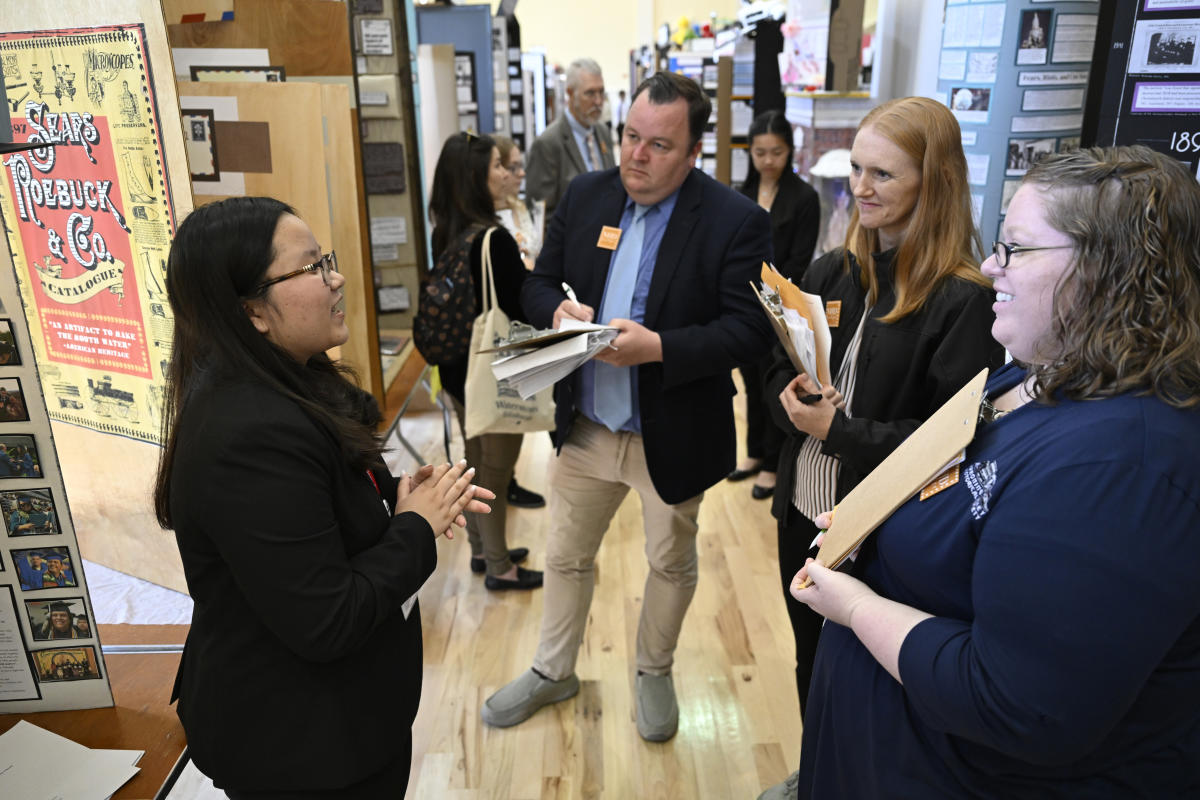COLLEGE PARK, Md. (AP) — It wasn’t your normal trifold poster board display screen. High school freshman Alexandra Bui built a jumbo mail-order brochure reproduction from wood sheets — an innovative, extra-large method to communicate her research study on the Sears brochure’s effect on getting durable goods to Black buyers who dealt with in-store discrimination in the Jim Crow South.
Bui, of Temple, Texas, is among half a million young scholars participating in this year’s National History Day, a Maryland-based not-for-profit’s yearly project that motivates trainees to take ownership of their history educations and carefully take a look at the past. As the 2024 edition marks 50 years of promoting evidence-based argumentation, individuals state they discover the work more appropriate than ever.
With trainees coming across harmful frauds online and some Republican-led states like Florida seeking to restrict historic analysis in the class, the competitors wishes to empower middle and high school trainees to dive deeper into subjects of their own picking.
“We can do our research study. We can talk with professionals. And we can determine the reality,” Bui informed The Associated Press.
This year’s style of “Turning Points in History” asked trainees to check out concepts or occasions that stimulated modification. More than 2,800 finalists reached the nationwide competitors after months invested going to libraries and reading main sources. Entrants lined University of Maryland corridors today as they anxiously waited to provide trifold exhibitions, documentaries and even theatrical efficiencies. They practiced lines or talked with their peers, in some cases bring props around school and changing period-appropriate outfits. National winners will be revealed Thursday, though all the trainees had actually currently thrived in numerous competitors simply to arrive.
National History Day was established to rejuvenate history curricula beyond the “uninteresting book” that trainees felt had “no significance,” according to executive director Cathy Gorn. She cast the objective nowadays as one that enhances democracy. A strong social research studies education is an “remedy to conspiracy theories” and required for establishing engaged residents, she stated.
Gorn discovers the procedure particularly efficient today when lots of kids wish to comprehend the background for present occasions. The not-for-profit does not “promote a specific program,” she highlighted, however rather guides trainees through their own queries. It gears up instructors with class resources for browsing the Library of Congress, performing narrative histories and annotating bibliographies, to name a few abilities.
“We are not informing the kids how to translate the past or what to translate of the past, however how to set about producing an analysis and an argument based upon the genuine research study,” Gorn informed AP.
“In finding out that, they discover the value of historic viewpoint,” Gorn included. “And they discover, ideally, to comprehend the past to be part of the future.”
National History Day likewise released a $15 million capital project, though Gorn stated it is hard raise funds for history education.
The liberal arts have actually traditionally gone underfunded in K-12 public education. However there’s a growing acknowledgment that high school finishes today needs to arrange through a a lot more intricate info environment than previous generations, according to David Knight, a teacher of education financing and policy at the University of Washington. The education policy world is starting to comprehend the increased requirement, for instance, to inform youths about the distinction in between main and secondary proof.
Judges stated the jobs boost a long-lasting pursuit of understanding that serves all trainees despite their future ventures. Among the most crucial lessons is to follow the “bunny hole,” according to Robyn Gausman-Burnett, a University of Maryland geographical sciences doctoral trainee. She stated National History Day trains trainees to never ever stop digging for “that next supporting piece of proof,” or “the other half of the story that isn’t quickly discovered on the Google search.”
“Nowadays on the web, there’s a great deal of incorrect info,” stated Macy Huish, a high schooler from Logan, Utah. “So having the ability to choose the little, golden nuggets is really crucial.”
“You may get resources that oppose with your thesis,” stated Hannah Jang, a trainee at a worldwide school in South Korea. “That’s likewise part of the procedure. You got to have the capability to accept it. And you can likewise study the factor behind it.”
Lots of trainees talked to by AP stated their jobs were substantiated of individual experiences. 3 middle schoolers who live near Alabama State University looked into an almost thirty yearslong federal lawsuit that effectively challenged financing variations in between traditionally Black schools and mainly white ones in their home state.
The legal fight becomes part of their history, they stated, and they wished to discover more about their history.
Well-known documentary filmmaker Ken Burns entrusted finalists with safeguarding American democracy. Throughout a Q&A with trainees, Burns stated they need to “state no” to “authoritarians” who want to go back the general public “back into a superstitious peasantry.” Burns informed AP that he felt positive to see many trainees “questioning and diving deep into archives and declining the limitations or the restrictions.”
“We’re simply attempting to inform complex stories about the United States,” he stated. “It can just bode well in the olden battle in between those who wish to restrict these things and those people who believe that we are freed by the reality.”
___
Associated Press protection of philanthropy and nonprofits gets assistance through the AP’s partnership with The Discussion United States, with financing from Lilly Endowment Inc. The AP is exclusively accountable for this material. For all of AP’s philanthropy protection, see https://apnews.com/hub/philanthropy.
